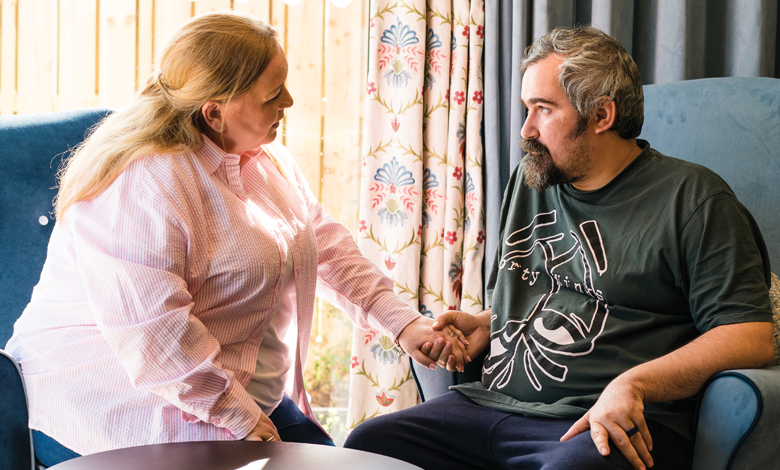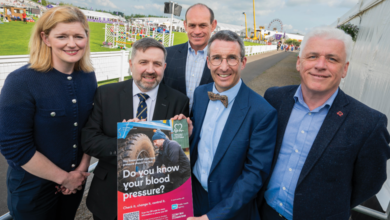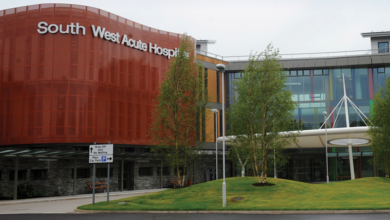With such an enormous impact now and into the future, we cannot afford to ignore dementia

Many of you reading this will personally know the impact of dementia on those living with it. It is a profound personal and family challenge, but the impact does not end behind closed doors. The pressure on the health and social care (HSC) system, and the huge personal and economic costs present the most urgent health challenge of our time, writes Ruth Barry, National Influencing Manager at Alzheimer’s Society.
The numbers are daunting. The cost of dementia in Northern Ireland is £1 billion a year now, forecasted to reach £2 billion in just 15 years. Tragically, that cost falls most heavily on those living with the condition and their carers (63 per cent). We, at Alzheimer’s Society, are determined to change this and, not only shine a light on the scale and urgency of the challenge but – for the first time – clear, evidence-based actions to ease pressure and reduce cost.
Around 25,000 people are living with dementia in Northern Ireland today, and at least a third of these people do not have a diagnosis. Research commissioned by Alzheimer’s Society estimates the number of people living with dementia will increase from approximately 25,000 to 37,500 by 2040. The scale of the increase is the highest amongst equivalent figures for England and Wales.
We can, and must, challenge the status quo. Policymakers have not prioritised dementia, and the rising costs and pressures are relentless. There are clear, positive choices that can be made NOW and must be made to support the HSC system to address the challenge presented by dementia, now and into the future.
Diagnosis is a sound investment
At the recent NICON conference, Heath Minister Mike Nesbitt MLA stated that if we do not make radical changes within the next 15 years; the health service will swallow up all public funding.
Let us choose to take a different path.
Today, across the UK, almost one million people with dementia access A&E every year, one in every six hospital beds are occupied by someone with dementia, and people with dementia make 16.2 million visits to GPs every year.
We are not simply pointing out problems in the system, we are presenting an overwhelming, evidence and policy-based case for change. Our evidence shows that people who are undiagnosed are disproportionately drawing on healthcare resources. Those who are undiagnosed are three times more likely to visit A&E than people without the condition. Undiagnosed people with dementia visit A&E more than people with mild, moderate, and severe dementia. If we do not act now, the health service will be completely overwhelmed.
The current diagnostic pathway is slow and disjointed, with significant variation in the quality of diagnosis services across Northern Ireland, including speed of delivery, accuracy and referral to support services. On average, a dementia diagnosis takes 3.5 years from the onset of symptoms, with no specific national target included in the Regional Dementia Pathway published in 2018 (which remains to be fully funded and implemented).

We have clear evidence that demonstrates the importance of early and accurate diagnosis yet spending on diagnosis and treatment in the UK is equivalent to just 1.4 per cent of dementia healthcare costs – in contrast, a third of all dementia health spend is in unplanned hospital admissions. We need to invest in dementia diagnosis through enhancing access to diagnosis services and collecting national and local diagnosis data. Without this, people will not be able to access existing treatments and interventions to help manage their symptoms today or be ready for the disease-slowing treatments of tomorrow.
Diagnosing someone with the UK’s biggest killer is more than just a moral duty. It unlocks access to support and potential treatments or interventions which directly translates into reduced system pressure.
Acting early has a huge impact
We now know, through the research Alzheimer’s Society commissioned from Carnall Farrar, that the average annual cost of dementia per person increases as the condition progresses, going from £29,000 for mild dementia to £81,000 for severe dementia. These are enormous cost differences and anything we can do to intervene early and effectively is critical.
By diagnosing people just one year earlier and providing access to these NICE-approved treatments where they are effective, modelling suggests there could be savings of tens of thousands of pounds by delaying the onset of severe symptoms. By delaying the impact, people with dementia can enjoy their independence and a better quality of life for longer, meaning that nursing home admission and expensive, intensive care required for more severe dementia, comes later down the line.
More research is needed to fully understand the impact of the available treatments. What we do know is that they are most effective the earlier they are given. To achieve these savings, we first need to diagnose people and diagnose them earlier.
Minister Nesbitt has set out his priorities, an intention to ‘reboot Bengoa’ and a renewed focus on dementia through the Regional Dementia Project Board. We know in starker terms than ever before that the foundations for delivering better care for people, for easing pressure, for reducing cost – begin with improving diagnosis.
As Lord Darzi says, citing our evidence in his recent report on the state of the NHS in England: “There is an important challenge to improve the quality and quantity of care for people with dementia.”
I could not agree more.
It will take a society to beat dementia.
This is a challenge which must be faced and faced now. It will take all of us together.
Call: 0333 150 3456. If you are affected by dementia, worried about a diagnosis or a carer, trained staff are ready to give you the support you need.






